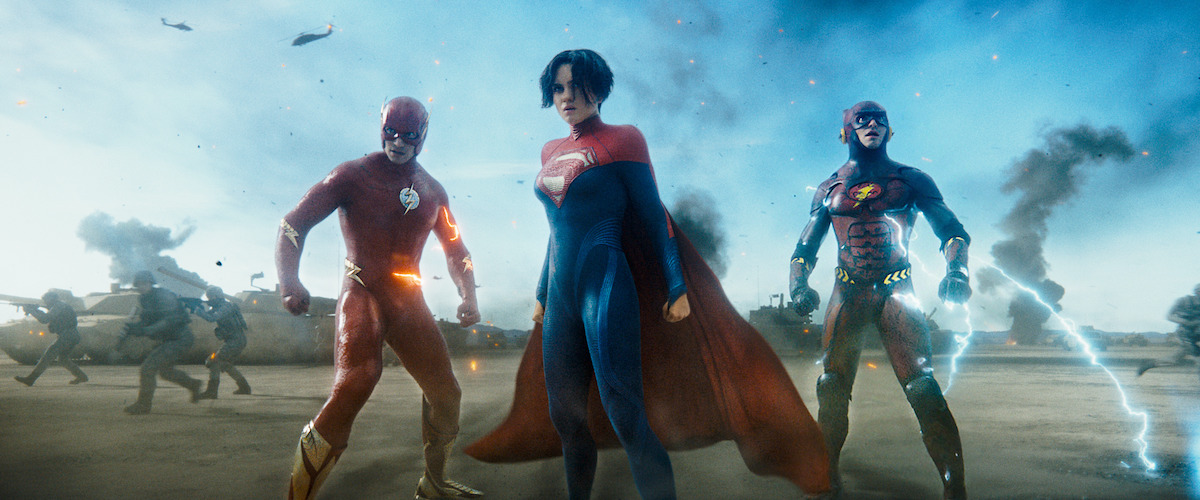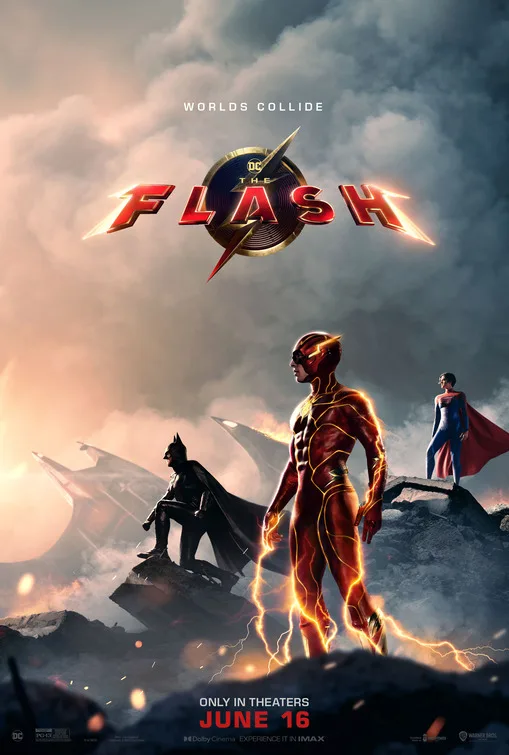One of the most spectacular and frustrating mixed bags of the superhero blockbuster era, “The Flash” is simultaneously thoughtful and clueless, challenging and pandering. It features some of the best digital FX work I’ve seen and some of the worst. Like its sincere but often hapless hero, it keeps exceeding every expectation we might have for its competence only to instantly face-plant into the nearest wall.
Then it hits the reset button and starts again—which, come to think of it, is what “The Flash” keeps doing over and over again narratively, with time, parallel universes, and the question of whether “canonical” events in the life of a person or a whole dimension can be altered. From start to finish, it suffers the double misfortune of being its own worst enemy, despite real thoughtfulness and an intriguingly unstable cocktail of genres (slapstick comedy, family drama, heavy metal action flick, philosophically driven science fiction adventure); and also arriving on screens right after the release of “Spider-Man: Across the Spiderverse,” a high watermark for both superhero movies and major studio animated features that explores most of the same concepts as “The Flash” in a more aesthetically innovative way.
Ezra Miller, whose offscreen brushes with the law make some of the film’s raunchier comedy land poorly, stars as twentysomething forensic scientist and secret superhero Barry Allen, who feels like the “janitor” of the Justice League and is still grappling with the impact of his mother’s murder and his father’s wrongful imprisonment for the crime. Here, again, in this very review, we encounter a double bind characteristic of “The Flash”: it’s poor form to discuss the meatier parts of the movie because you can’t do that without describing the plot in detail, and yet at the same time, a lot of it has already been “spoiled,” not just on social media and online forums but in the film’s own trailers and marketing material (Warner Bros. supplied the photo at the top of this review) and on Wikipedia. If you read all that, you know whether to keep going or put the rest of this piece aside for later.
For those still reading: Remember the ending of the original 1978 “Superman: The Movie,” where Christopher Reeve’s Superman has to choose between stopping a nuclear missile headed for Miss Tesmacher’s home state and preventing his great love Lois Lane from getting killed by an earthquake, tries to do both, loses Lois, then turns back time to resurrect her? Well, that sequence has been expanded into an entire film and merged with the “Back to the Future” series, courtesy of Barry’s decision to try to go back in time and change one detail on the day his family was destroyed. Mom (Maribel Verdú) sent Dad (Ron Livingston) to the local supermarket to fetch a can of tomatoes she needed for a recipe. When little Barry hears a commotion and comes downstairs, he finds Mom on the kitchen floor with a knife jammed into her bloody chest and Dad weeping over her corpse with one hand on the hilt. Barry surmises that he can use his Flash powers to return to that fateful day, add a can of tomatoes to Mom’s supermarket basket, and save both parents. Anybody who’s seen a time travel movie (or read Ray Bradbury’s short story The Sound of Thunder) knows it’s not that simple.
Directed by Andy Muschietti (“Mama,” both “It” movies), from a script by ace genre screenwriter Christina Hodson (“Birds of Prey,” “Bumblebee“), “The Flash” deserves credit for taking its ideas and the pain of its characters seriously without devolving into glum, colorless machismo. When Miller enters what he believes is “the past” (it’s actually an alternate timeline), he not only encounters another version of himself with an intact, happy family but befriends and mentors the other Barry, discovering along the way how annoying he can be to others.
Muschietti over-directs the pre-time-travel version of Barry, emphasizing his anxiety, clumsiness, and facial tics to the point where he seems like one of those schlemiels that Jerry Lewis used to play. But once the original Barry teams up with the other Barry, Miller keeps the schlemiel energy high for the second Barry while dialing it down for the original. This lets the first Barry mature in increments, part of the traditional arc of a young hero. The film showcases its finest effects in these mirror-image duets. The result is the most convincing instance of a leading man playing opposite himself since Michael Fassbender in “Alien: Covenant.” The shots of both Barrys even have a smidge of handheld shakiness that’s visual shorthand for “authenticity.” Within a scene or two, you’ll likely forget that it’s one actor playing the same part and instead focus on what Miller does with both incarnations of the character.
The master narrative of the DCEU defines Superman’s city-leveling battle with General Zod in “Man of Steel” as a character- and team-defining canonical event for every interlinked feature film in the series. The aftermath of that contest figured into the plots and dialogue of more than one film, most notably “Batman vs. Superman: Dawn of Justice.” When it’s referenced again in the film’s first act, you know Barry and Barry will have to deal with it again in another universe. Sure enough, here comes Zod with his villainous teammates, scarab starships, armored shock troopers, and terraforming World Engine.
The problem is, there’s no Justice League to team up against him, and only one superhero: the Caped Crusader. Not Ben Affleck’s grizzled, Frank Miller-y Batman, but the one played by Michael Keaton in the 1980s Tim Burton films. Only he’s older, more haggard, and even more alienated from the society he monitors. As the time-ripened version of Burton’s Batman, essentially Bruce Wayne fused with the long-haired hermit incarnation of Howard Hughes, Keaton gives the movie’s subtlest performance. He underplays and reacts in a way that adds freshness to a story that’s probably too dependent on recycled situations and makes Miller’s jumpy, abrasive tendencies easier to take. He’s the acting version of a shock absorber, smoothing the ride without slowing it down.
Barry, Barry, and Bruce become convinced that this universe’s Superman is trapped in a Siberian prison run by Russian mercenaries and fly there to bust him out. Turns out he’s a she: Kara Zor-El, Kal-El’s cousin, aka Supergirl (Sasha Calle, rocking a modified pixie cut and a killer stare). Superman, we’re told, might still be out there somewhere, but his cousin (who was sent to protect him) is a powerful ally who can stand up to Zod. When the modified four-person Justice League substitute confronts Zod’s invading army, the movie proves that its obsessive referencing of the “Back to the Future” films was not just a running gag.
The reimagining of Zod’s attack is this movie’s equivalent of the end of the second “BTTF” movie, where time-traveling adolescent Marty McFly (played by Michael J. Fox in our world, and in Barry’s by Eric Stoltz, the actor Fox replaced!) had to attend the same prom that ended the original “BTTF” while avoiding a potentially time/space disruptive encounter with himself. (This movie’s decisions about what to save and what to delete from real world history are weird; I’d love to hear the logic behind erasing a lot of the DCEU superheroes from the second Barry’s universe while determining that “Back to the Future,” “Footloose,” and “Top Gun” and the first Chicago album were immutable occurrences.)
The film’s big battle is its least convincing sequence (parts of it look like cutscenes from an early-aughts game). It’s too bad, because it’s the most thought-provoking: as Batman and the Flashes and Supergirl battle Zod, the two Barrys disagree on whether traveling back and forth along dimensional pathways will solve problems or add new ones. Like most science fiction with even the thinnest veneer of seriousness, “The Flash” connects back to the godmother of science fiction, Mary Shelley’s Frankenstein, or, The Modern Prometheus. Shelley warned readers that using science to mimic God or defy nature has bad consequences, and it’s better for the story’s Prometheus figure to give up his illusions than continue traveling a ruinous path. Is this the sort of film that will heed Shelley’s warning, or ignore it to give the hero what he wants and the audience the wish-fulfillment fantasies it craves and that superhero films nearly always endorse? Even the first two Reeve Superman films erred on the side of audience wish-fulfillment; the first film lets him turn back time, while the second has him erase Lois’ knowledge of his secret identity with a super-kiss. “The Flash” deserves credit for threading the eye of that needle, giving audiences a somewhat hopeful ending without negating the philosophical and scientific issues it raises elsewhere.
Unfortunately, “The Flash” also has a countervailing tendency that undermines its best self. Even as it cleverly translates Shelley’s worries into contemporary comic book terms, it serves up callback after fan-wanking callback to other versions of heroes and villains from film and TV, seemingly with no other purpose than to burnish Warner Bros’ properties and make the audience point to the screen and whisper the names of actors, characters, films, TV shows, and comic books that they recognize. Batman, Batman, Batman, Batman, Superman, Superman, Superman, Superman, Flash, Flash, Flash, etc., keep popping up scenes set in the “Chrono-Bowl,” a cosmic switching station with a design that alludes to clockwork gears, the concentric rings of chopped-down trees, theater-in-the-round, and a tribunal.
And rather than find an artful, modest way to repurpose library footage from earlier adaptations of DC comics—as, say, “In the Line of Fire” did with footage of a younger Clint Eastwood from “Dirty Harry“—the actors who originally played them, many of whom died long ago, have been scanned (or rebuilt) as vaguely three-dimensional but uncanny grotesques, like Madame Tussaud’s wax figures laid over audio-animatronic puppets. Remember the process that “reanimated” Peter Cushing in “Star Wars: Rogue One,” and later served up an even more unsettling “young Carrie Fisher” in the climax, paving the way for a nearly expressionless “young Mark Hamill” on “The Mandalorian,” and de-aged ’70s movie stars for various legacy sequels? It gets trotted out and multiplied ad nauseam here, even though the technology hasn’t improved much.
The film’s principal cast also gets the zombie CGI treatment in the Chrono-Bowl, to visualize alternate realities. Some of the versions of these real, living actors with SAG cards and regularly updated IMDb pages look faintly demonic. The torsos and hands aren’t anatomically credible. One has eyes that point in opposite directions like a gecko. Were the deadlines rushed and the digital effects artists exploited until quality control disappeared—a problem throughout the entertainment industry—or is the technology just not there yet? And even if it ever does “get there,” will it ever not seem one (digital) step removed from wrapping a mannequin in corpse-flesh? Doing this sort of thing in a purely animated format moots such concerns. Everything in an animated comics adaptation is a drawing inspired by other drawings, and therefore a representation of a thing that is not meant to seem “real.” Not so in live-action. “Hey, that’s Actor X!” gives way to, “He looks kinda creepy and unreal,” and the spell is broken.
What a mess. And what a shame, because what’s good about “The Flash” is very good. The movie puts a lot of thought into what it wants to say and not enough into how it says it. It avidly warns against a thing while at the same time doing a version of that same thing. Barry, driven by a desire to resurrect the dead, grapples with the ethics and advisability of actions that the film constantly performs, in small ways and large, without breaking a sweat.
Opens Friday, June 16th.




















